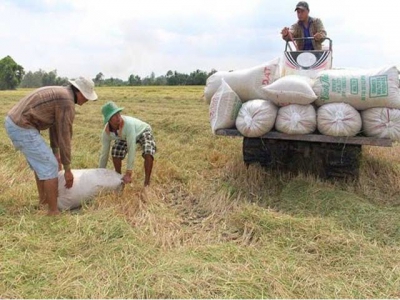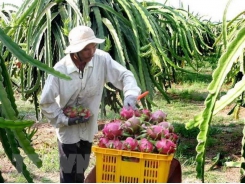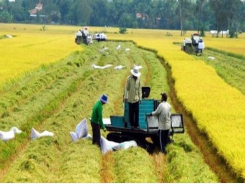Chinese firms explore Mekong Delta for rice trade

Farmers harvest their rice crop. Chinese firms have visited the Mekong Delta region to seek opportunities in the rice trade - PHOTO: TRUNG CHANH
Ho Chi Minh City – A group of Chinese enterprises, led by the National Food Authority of China, is working with the business community in the Mekong Delta region, seeking opportunities in the rice trade.
The cooperation is expected to push up Vietnamese rice exports to the Chinese market.
Speaking at a meeting in Can Tho City on August 8, a representative of the group, Wang Zhi Xi, chairman of Guangdong-based Thai Luong Food Company in China, said the company specializes in food and that its products are sold in major supermarkets in Guangdong province.
“The company’s sales may reach up to 800 tons per day and an average of 300,000 tons per year,” he said.
Xi also expected to boost cooperation in the rice trade with Vietnamese firms due to the growing demand for rice in China
According to Dao Viet Anh, commercial counselor of the Vietnamese Embassy in China, trade between Vietnam and China has expanded strongly in recent years.
Anh cited statistics from China Customs as saying as saying that in 2017, bilateral trade between the two countries amounted to some $121 billion, up by a staggering 23.4% year-on-year. “China has been Vietnam’s largest commercial partner in ASEAN for 14 consecutive years,” Anh added.
Statistics also show that China imported 3.99 million tons of rice in 2017, rising by 12.96% against 2016. Of this, Vietnamese rice amounted to 2.26 million tons, making up 56.72% of the total. China purchased 1.78 million tons of rice and cereals in the first six months of 2018, slipping by 2% year-on-year, with 850,000 tons of rice being imported from Vietnam.
A report released by the Ministry of Agriculture and Rural Development shows that the first seven months of this year saw Vietnamese rice exports amounting to 3.9 million tons, worth some US$2 billion, up by 12.2% in volume and a whopping 29.2% in value year-on-year.
Nguyen Minh Toai, director of the Can Tho Department of Industry and Trade, said Chinese firms have proactively entered the Mekong Delta region in Vietnam to research the region’s rice production, and its work with the rice business community proves that China’s demand for rice imports is rising sharply.
Can Tho City has only four enterprises that can meet the Chinese demand and that are permitted to directly export rice to the neighboring country, according to Toai, who added that the number of Vietnamese rice exporters was expected to increase over time.
However, Anh voiced concern over difficulties Vietnamese firms are likely to face in transporting rice to China in 2018 and the failure to maintain the momentum, even though China is a potential market, explaining that the country’s tax policies on rice imports were revised upward and came into force on July 1. He cited tough competition with other rice exporters as another challenge.
Anh suggested that the rice quality should be improved in line with the commitments on quarantine signed between the two countries, with the aim of strengthening rice exports to China.
Besides this, it is necessary to proactively find partners through trade activities and to build the national rice brand, Anh said. In addition to traditional forms of commerce, Anh noted ecommerce is popular and effective in China.
Có thể bạn quan tâm
Phần mềm

Phối trộn thức ăn chăn nuôi

Pha dung dịch thủy canh

Định mức cho tôm ăn

Phối trộn phân bón NPK

Xác định tỷ lệ tôm sống

Chuyển đổi đơn vị phân bón

Xác định công suất sục khí

Chuyển đổi đơn vị tôm

Tính diện tích nhà kính

Tính thể tích ao hồ



 China imports nearly 91% of Vietnam’s lychees
China imports nearly 91% of Vietnam’s lychees  Vietnam sells more rice to China, raising concerns
Vietnam sells more rice to China, raising concerns